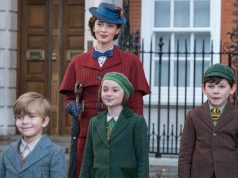I will say this for “Old Dogs”: It is exactly as funny as you’d expect a movie to be that stars John Travolta and Robin Williams as two bachelors who must suddenly take care of precocious 7-year-old twins, and that was directed by the man who made “Wild Hogs.” Which is to say, it is not the least bit funny, not once, not even for a minute. Imagine a season’s worth of plot devices from TV’s most generic sitcom crammed into 88 excruciating minutes.
Here are the thoughts of Williams’ character in this frantic, contrived mess: I had a one-night stand seven years ago, and it turns out I’m the father of twins! And now I have to babysit them for two weeks! But I’m working on the Big Account at my job, and I don’t have time! Oh no, they don’t allow children in my condos — apparently not even temporarily, to visit — so we have to stay with my best friend at his un-child-proofed apartment! Oh no, if I screw up this golf game with the client, it’ll blow everything — and I accidentally took my friend’s medication this morning that gives me hallucinations! Oh no, my friend and I are going to breakfast with the kids, and everyone thinks we’re their grandparents! And now the staff is singing a “welcome to the grandparents’ club” song, which surely does not exist in real life anywhere! How embarrassing! And now we’re on a camping trip with the kids, and the scout leader thinks my friend and I are gay, except we’re too stupid to realize he thinks that, because somehow it’s “funnier” if we don’t know! Doh! We’re on a collision course with wackiness!!
The basic premise of a person changing his or her priorities after suddenly having to take care of a child is overdone to begin with, and this one — directed by Walt Becker and written by David Diamond and David Weissman (“The Family Man,” “Evolution”) — is exceptionally lazy and illogical. Dan (Williams) and Charlie (Travolta), lifelong best friends who own a sports-marketing firm, aren’t characters; they’re blank slates on whom new traits can be written depending on the needs of the scene.
For example, we have no indication that Dan lacks the imagination and sense of fun necessary to play-act with children until suddenly, in one scene, Charlie gets a puppeteer friend of his to hook Dan up to wires so that Charlie can control him remotely and walk him through the motions of having a pretend tea party with his daughter. You could almost forgive how unbelievably stupid that idea is if the film had previously established that Dan was too literal-minded or uptight to play with kids, or if he weren’t played by an actor whose most famous characteristic is being freewheeling and fun. But no such thing had been established. What happened was, they thought it would be funny if Charlie got to control Dan electronically, and so they tried to think of a reasonable plot device that would lead to such a scenario. And when they couldn’t think of one, they did it anyway.
This is typical of the entire film. Nothing about the premise or its execution is logical, and all the complications arise either because something implausible happened, or because something plausible happened but the characters reacted to it idiotically. You have children (played by Conner Rayburn and Ella Bleu Travolta) who have never met or heard about their father until this day, yet who instantly call him “Daddy.” You have a character established as being a hand model whose hands are then slammed in a car trunk — and the trunk actually latches shut, and Dan can’t open it because suddenly the button on his keychain that should pop the trunk instead honks the horn and locks the doors and does everything except pop the trunk. You have Dan getting a fake tan to look good for his reunion with the mother of his children (Kelly Preston), only he accidentally overdoes it and looks dreadfully orange — only to have the woman tell him she knows an “old family secret” that will help him out, and sure enough, in the next scene his skin is normal again. The incident tells us nothing about the characters and has no impact on the plot. It’s there JUST to get a cheap chuckle out of seeing Robin Williams painted orange — one lame sight gag.
In a good comedy, the humor appears to arise naturally out of the situations the characters find themselves in. Bad comedy is retrofitted: The writers think of the “funny” situation first, then find a way to cram the characters into it. Plenty of good comedy writers work backwards like that, too — but what makes them good is that they cover their tracks and make it look totally uncontrived. If I didn’t know better, I’d think this was a parody of movies of this genre, intentionally written to be as generic, imbecilic, and simple-minded as possible. Sadly, I suspect this is actually the best they could do. If you go, expect many kicks to the crotch, a lot of exaggerated, bug-eyed panicking, and no laughs.
(Note: For some reason, Seth Green is in this movie. Do not let that fool you into thinking it might be funny.)
F (1 hr., 28 min.; )





